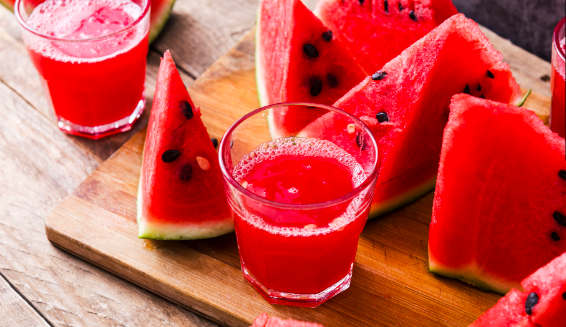
Why Watermelon?
Research published in the Journal of Agricultural and Food Chemistry (July 2013) found watermelon juice is an effective remedy for reducing the recovery heart rate and muscle soreness in athletes who were given 500 ml of watermelon juice containing 1.17 grams of the naturally occurring amino acid L-citrulline.
Boosting Your Antioxidant Levels:
Watermelon is exceptionally rich in lycopene (hence its red colour) and other carotenoids such as lutein and beta carotene.
A 2003 study published in The Journal of Nutrition found that regular watermelon juice consumption resulted in significant increases in blood plasma concentrations of lycopene and beta carotene.
Lycopene has been found to have over 40 potential health benefits, and beta carotene (especially in its natural, food-complexed form) equally plentiful health benefits, adding extra significance to this finding. Also, the watermelon-induced increase in plasma antioxidant levels may lend explanation to why an epidemiological study of the Chinese found greater watermelon intake to be associated with a lower risk of cancer.
Reducing Blood Pressure/Improving Arterial Health:
A 2012 study published in the American Journal of Hypertension found that middle-aged obese subjects with prehypertension or stage 1 hypertension who were given 6 weeks of treatment with a watermelon extract containing 6 grams of L-citrulline and L-arginine daily, experienced reduced ankle blood pressure and altered carotid wave reflection, an indication of improved arterial function.
The inability of the blood vessels to dilate and function properly is known as endothelial dysfunction, and is an initiating step in the pathogenesis of atherosclerosis. If watermelon can ameliorate or reverse this process, it would certainly provide a breakthrough alternative to many of the drugs used for primary prevention, such as the cholesterol-lowering statin drugs, whose side effects, numbering in the hundreds, include heart muscle dysfunction and damage.
Increasing Plasma Arginine Concentrations:
A 2007 study published in Nutrition found that watermelon juice consumption increases plasma arginine concentrations in adults, proving that the L-citrulline from this plant origin was effectively converted into arginine. This is a highly significant finding because arginine has a great number of health benefits. There are at least 20 studies in the biomedical literature documenting its therapeutic role in improving endothelial dysfunction.
Combatting Metabolic Syndrome:
A promising preclinical study published in The Journal of Nutrition in 2007 found that watermelon pomace, a rich source of L-citrulline, significantly improved metabolic syndrome in diabetic, overweight rats.
These results provide the first evidence of a beneficial effect of watermelon pomace juice as a functional food for increasing arginine availability, reducing serum concentrations of cardiovascular risk factors, improving glycemic control, and ameliorating vascular dysfunction in obese animals with type-II diabetes.
Watermelon seeds are an excellent source of protein. A 2011 study published in the Journal of Cancer Research and Clinical Oncology found that “The good nutritional and functional properties of watermelon seed meal proteins suggest their potential use in food formulations.”
Lose weight healthfully with Ann Wigmore’s RECIPES FOR LONGER LIFE.




